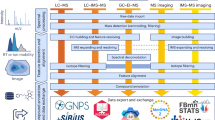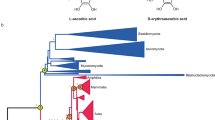Abstract
OUR earlier experimental work using labelled thiosulphate has shown that the two atoms of sulphur in this compound have different fates in the course of metabolism in the animal organism1. In rats, the inner sulphur atom is eliminated very quickly from the organism in the form of sulphate, while the outer atom is transformed into the sulphate much more slowly, going probably through a number of intermediate stages. The results of our investigations have shown that the thiosulphate may be the metabolic precursor of the sulphate, and that, however small its concentration in rat urine may be, the endogenous pool of thiosulphate is large (ref. 1b).
This is a preview of subscription content, access via your institution
Access options
Subscribe to this journal
Receive 51 print issues and online access
$199.00 per year
only $3.90 per issue
Buy this article
- Purchase on Springer Link
- Instant access to full article PDF
Prices may be subject to local taxes which are calculated during checkout
Similar content being viewed by others
References
(a) Skarżyński, B., Szczepkowski, T. W., and Weber, M., Nature, 184, 994 (1959); (b) Ada Biochim. Polonica (in the press).
Gast, J. H., Arai, K., and Aldrich, F. L., J. Biol. Chem., 196, 875 (1952).
Author information
Authors and Affiliations
Rights and permissions
About this article
Cite this article
SZCZEPKOWSKI, T., SKARŻYŃSKI, B. & WEBER, M. The Metabolic State of Thiosulphate. Nature 189, 1007–1008 (1961). https://doi.org/10.1038/1891007a0
Issue Date:
DOI: https://doi.org/10.1038/1891007a0
This article is cited by
-
Primary hepatocytes from mice lacking cysteine dioxygenase show increased cysteine concentrations and higher rates of metabolism of cysteine to hydrogen sulfide and thiosulfate
Amino Acids (2014)
-
Dealing with methionine/homocysteine sulfur: cysteine metabolism to taurine and inorganic sulfur
Journal of Inherited Metabolic Disease (2011)
-
Cyanide toxicity of sodium nitroprusside in therapeutic use with and without sodium thiosulphate
Klinische Wochenschrift (1982)
Comments
By submitting a comment you agree to abide by our Terms and Community Guidelines. If you find something abusive or that does not comply with our terms or guidelines please flag it as inappropriate.



